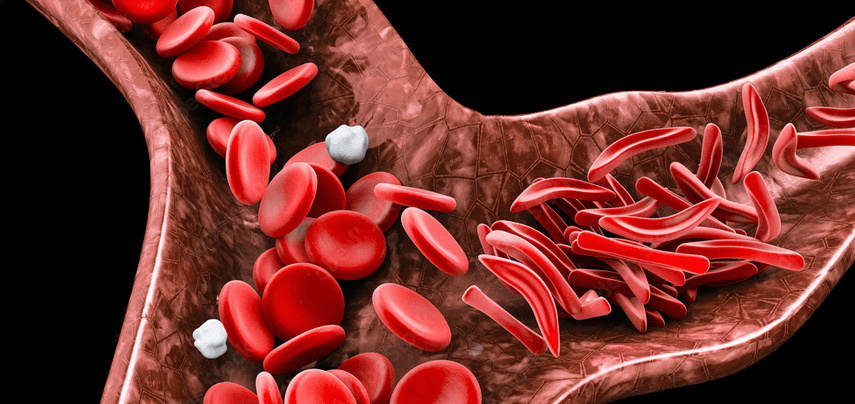Table des matières
Qu'est-ce que la maladie du sang de Sickle (SCD) et qu'est-ce qui rend les globules rouges en forme de faucille?
La maladie de la drépanocytose (également appelée drépanocytose aiguë) est un groupe de troubles des globules rouges que vous avez hérités et avec lesquels vous êtes né. La maladie de la drépanocytose est causée par une forme anormale d'hémoglobine. C'est la partie de votre globule rouge qui transporte l'oxygène dans le corps et maintient vos organes vitaux en fonctionnement. Dans la maladie de la drépanocytose, l'hémoglobine anormale (HbS) n'est pas capable de fonctionner correctement. Les globules rouges deviennent rigides et bloquent les vaisseaux sanguins de votre corps, provoquant des douleurs et des dommages, et ils sont également détruits rapidement, entraînant une anémie et d'autres complications. Actuellement, il n'existe pas de traitement universel pour la maladie de la drépanocytose et environ 4000 Ontariens en souffrent.
Il y a une substance dans le globule rouge appelée hémoglobine. Elle transporte l'oxygène de l'air dans nos poumons vers toutes les parties du corps, y compris les globules sanguins. Un petit changement dans cette substance fait que l'hémoglobine forme de longues tiges dans les globules rouges lorsqu'elle libère de l'oxygène. Ces tiges rigides changent les globules rouges en forme de faucille au lieu de la forme ronde normale.
Les globules rouges normaux contiennent de l'hémoglobine A. L'hémoglobine S et l'hémoglobine C sont des types anormaux d'hémoglobine. Les globules rouges normaux sont souples et ronds et peuvent se faufiler à travers de minuscules tubes sanguins (vaisseaux). Normalement, les globules rouges vivent environ 120 jours avant que de nouveaux ne les remplacent.
Les personnes atteintes de conditions de drépanocytose produisent une forme différente d'hémoglobine A appelée hémoglobine S (S signifie faucille). Les globules rouges contenant principalement de l'hémoglobine S ne vivent pas aussi longtemps que les globules rouges normaux (en moyenne environ 16 jours).
Que signifie avoir la drépanocytose pour moi ?
C'est quelque chose que vous aurez toute votre vie et que vous devez apprendre à vivre avec, afin de pouvoir continuer à vivre aussi normalement que possible, avec les études, le travail et la vie de famille. Comme c'est héréditaire, vous devez également connaître le statut de votre partenaire concernant la drépanocytose, car vous pourriez le transmettre à vos futurs enfants également.
Types de drépanocytose Il existe plusieurs types de drépanocytose. Les plus courants sont l'anémie falciforme (SS), la maladie à hémoglobine C (SC), la bêta-thalassémie falciforme plus et la bêta-thalassémie falciforme zéro.
Qu'est-ce que le trait drépanocytaire (SCT) et que signifie avoir le trait drépanocytaire ?
Le trait de drépanocytose (AS) est une condition héréditaire dans laquelle à la fois l'hémoglobine A et S sont produites dans les globules rouges, toujours plus A que S. Le trait de drépanocytose n'est pas un type de maladie drépanocytaire. Les personnes ayant le trait de drépanocytose sont généralement en bonne santé. Un porteur a un gène d'hémoglobine normal et un gène d'hémoglobine de drépanocytose. Un porteur n'a pas, et ne développera pas, la maladie drépanocytaire. Tous les groupes ethniques devraient être dépistés pour cette hémoglobine à la naissance.
Un porteur de la maladie drépanocytaire est également dit avoir le trait de drépanocytose. Cette personne a hérité d'un gène de drépanocytose d'un parent, mais n'a pas de MCD et n'est pas plus susceptible de tomber malade que toute autre personne. Ils n'ont pas besoin de soins médicaux spéciaux et ne développeront pas de MCD à aucun moment de leur vie.
Pourquoi est-il utile de savoir que je suis un porteur de MCD, ou si mon enfant est un porteur ? Savoir si vous ou votre enfant a le trait de drépanocytose est important pour plusieurs raisons. Lorsque vous êtes prêt à fonder une famille, votre partenaire peut passer un test de porteur afin que vous sachiez, en tant que couple, s'il y a une chance d'avoir un enfant avec une MCD. En ayant cette information, vous pouvez informer votre enfant s'il est ou elle est un porteur de MCD à l'avenir.
Lorsqu'un enfant a le trait drépanocytaire
Lorsque un enfant a une copie du gène de la drépanocytose, il est très probable qu'un des parents ait une copie du gène de la drépanocytose, ou :
Les deux parents sont porteurs
Un parent a réellement la drépanocytose
Un parent est porteur et l'autre a la drépanocytose
Si j'ai d'autres enfants, pourraient-ils avoir la drépanocytose ?
Le plus souvent, lorsque un enfant est porteur de la drépanocytose, seul un parent est porteur et la chance d'avoir un bébé avec la drépanocytose est très faible.
Lorsque les deux parents sont porteurs, chaque grossesse qu'ils ont a :
1 sur 4 (25%) de chances d'avoir la drépanocytose
1 sur 2 (50%) de chances d'être porteur (mais de ne pas avoir la drépanocytose)
1 sur 4 (25%) de chances de ne pas avoir la drépanocytose ou d'être porteur
Vous pouvez faire un test sanguin pour savoir si vous êtes porteur de la drépanocytose. Si vous souhaitez faire ce test, parlez à votre fournisseur de soins de santé. Un porteur n'a pas et ne développera pas la maladie de la drépanocytose.
Caractère de drépanocytose en Ontario :
Un pourcentage significatif d'Ontariens d'ascendance africaine peut porter le gène de la drépanocytose et dans certains cas, en fonction de la région d'origine, le taux de porteur peut atteindre 25%. Les personnes atteintes de SCT ne présentent généralement pas de symptômes de la drépanocytose et n'ont pas besoin de soins médicaux spéciaux. Connaître votre statut de drépanocytose est important !
Articles







